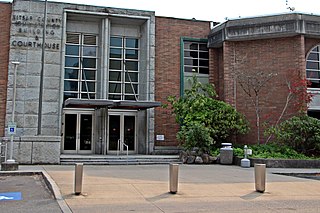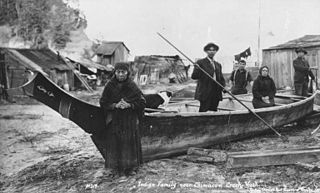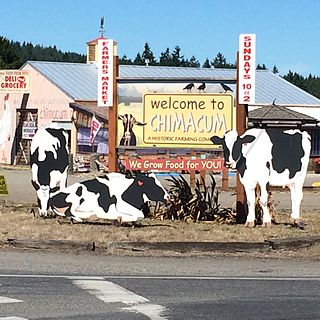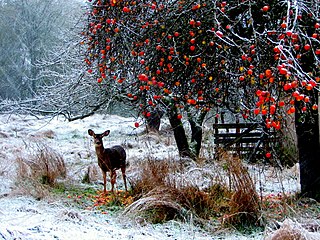Related Research Articles

Kitsap County is located in the U.S. state of Washington. As of the 2020 census, its population was 275,611. Its county seat is Port Orchard, and its largest city is Bremerton. The county was formed out of King County and Jefferson County on January 16, 1857, and is named for Chief Kitsap of the Suquamish Tribe. Originally named Slaughter County, it was soon renamed.

The Suquamish are a Lushootseed-speaking Native American people, located in present-day Washington in the United States. They are a southern Coast Salish people. Today, most Suquamish people are enrolled in the federally recognized Suquamish Tribe, a signatory to the 1855 Treaty of Point Elliott. Chief Seattle, the famous leader of the Suquamish and Duwamish Tribes for which the City of Seattle is named, signed the Point Elliot Treaty on behalf of both Tribes. The Suquamish Tribe owns the Port Madison Indian Reservation.

The Skokomish are one of nine tribes of the Twana, a Native American people of western Washington state in the United States. The tribe lives along Hood Canal, a fjord-like inlet on the west side of the Kitsap Peninsula and the Puget Sound basin. Historically the Twana were hunters, fishers, and gatherers who had a nomadic lifestyle during the warmer months, while living in more permanent homes during the winter months.

Klallam refers to four related indigenous Native American/First Nations communities from the Pacific Northwest of North America. The Klallam culture is classified ethnographically and linguistically in the Coast Salish subgroup. Two Klallam bands live on the Olympic Peninsula and one on the Kitsap Peninsula in Washington state, and one is based at Becher Bay on southern Vancouver Island in British Columbia.
The Jamestown S'Klallam Tribe is a federally recognized tribe of S'Klallam or Klallam Native Americans. They are on the northern Olympic Peninsula of Washington state in the northwestern United States.
The Kitsap Peninsula lies west of Seattle across Puget Sound, in Washington state in the Pacific Northwest. Hood Canal separates the peninsula from the Olympic Peninsula on its west side. The peninsula, a.k.a. "Kitsap", encompasses all of Kitsap County except Bainbridge and Blake Islands, as well as the northeastern part of Mason County and the northwestern part of Pierce County. The highest point on the Kitsap Peninsula is Gold Mountain. The U.S. Navy's Puget Sound Naval Shipyard, and Naval Base Kitsap are on the peninsula. Its main city is Bremerton.

The Snohomish are a Lushootseed Native American tribe who reside around the Puget Sound area of Washington, north of Seattle. They speak the Lushootseed language. The tribal spelling of their name is Sdoh-doh-hohbsh, which means "lowland people" according to the last chief of the Snohomish tribe, Chief William Shelton. Some commentators believe a more accurate spelling in the Latin alphabet would be Sdohobich, as their language has no nasal consonants.

The Chimakum, also spelled Chemakum and Chimacum Native American people, who lived in the northeastern portion of the Olympic Peninsula in Washington state, between Hood Canal and Discovery Bay until their virtual extinction in 1902. Their primary settlements were on Port Townsend Bay, on the Quimper Peninsula, and Port Ludlow Bay to the south.

Hansville is an unincorporated community and census-designated place (CDP) in Kitsap County, Washington, United States. Its population was 3,858 as of the 2020 census. The coastal community is located at the northern end of the Kitsap Peninsula and is about 16 miles (26 km) northeast of Poulsbo, the nearest city.

Kalaloch is an unincorporated resort area entirely within Olympic National Park in western Jefferson County, Washington, United States. Kalaloch accommodations are on a 50-foot (15 m) bluff overlooking the Pacific Ocean, west of U.S. Route 101 on the Olympic Peninsula, north of the reservation of the Quinault Indian Nation.

Twana is the collective name for a group of nine Coast Salish peoples in the northern-mid Puget Sound region, most of whom are extinct or are now subsumed into other groups and organized tribes. The Skokomish are the main surviving group and self-identify as the Twana today. The language spoken by these peoples is closely related to Lushootseed and is also called Twana.
Little Boston is a community in Kitsap County, Washington, United States. It is located on the east side of Port Gamble, an inlet or bay of Hood Canal, and is direct across the bay from the unincorporated community of Port Gamble. Little Boston is within the Port Gamble Indian Reservation, which houses the Port Gamble band of the S'Klallam tribe.
The Samish are a Native American people who live in the U.S. state of Washington. They are a Central Coast Salish people. Through the years, they were assigned to reservations dominated by other Tribes, for instance, the Swinomish Indians of the Swinomish Reservation of Washington and the Tulalip Tribes of the Tulalip Reservation. They are also enrolled in the Samish Indian Nation, formerly known as the Samish Indian Tribe, which regained federal recognition in 1996.

Chimacum is an unincorporated community in Jefferson County, Washington, United States, located in the center of the primary agricultural area of the eastern Olympic Peninsula. It was named after the Chimakum group of Indigenous Americans that lived there until the late 19th century but are now extinct as a distinct cultural group. Chimacum Creek is named after the Chimakum, a Native American people known to themselves as Aqokúlo, who lived on the northeastern portion of the Olympic Peninsula through the mid-19th century and whose economy, culture and religion were based on salmon fishing. Their primary settlements were on Port Townsend Bay, on the Quimper Peninsula, and Port Ludlow Bay to the south. According to tradition, the Chimakum were a remnant of a Quileute band who had been carried away in their canoes by a great flood through a passageway in the Olympic Mountains and deposited on the other side of the peninsula. In 1855 the Twana and Chimakum, along with the Klallam, signed the Point No Point Treaty, which established a reservation at the mouth of the Skokomish River near the southern end of Hood Canal. One of the Chimakum signatories of the treaty was Chief Kulkakhan, also known as General Pierce. After this, most Chimakum people merged into the S’Klallam and Skokomish tribes, where their descendants still live today.

The Treaty of Point Elliott of 1855, or the Point Elliott Treaty,—also known as Treaty of Point Elliot / Point Elliott Treaty—is the lands settlement treaty between the United States government and the Native American tribes of the greater Puget Sound region in the recently formed Washington Territory, one of about thirteen treaties between the U.S. and Native Nations in what is now Washington. The treaty was signed on 22 January 1855, at Muckl-te-oh or Point Elliott, now Mukilteo, Washington, and ratified 8 March and 11 April 1859. Between the signing of the treaty and the ratification, fighting continued throughout the region. Lands were being occupied by European-Americans since settlement in what became Washington Territory began in earnest from about 1845.
The Lower Skagit are a tribe of the Lushootseed Native American people living in the U.S. state of Washington. Today they are enrolled in the federally recognized tribe, the Swinomish Indians of the Swinomish Reservation.

The Lower Elwha Klallam Tribe is a federally recognized Native American nation in the Pacific Northwest of the United States. The tribe is part of the larger Klallam culture, part of the Coast Salish peoples.

The Skokomish Indian Tribe, formerly known as the Skokomish Indian Tribe of the Skokomish Reservation, and in its own official use the Skokomish Tribal Nation, is a federally recognized tribe of Skokomish, Twana, Klallam, and Chimakum people. They are a tribe of Southern Coast Salish indigenous people of the Pacific Northwest located in Washington. The Skokomish are one of nine bands of Twana people.

The Port Gamble S'Klallam Tribe, formerly known as the Port Gamble Indian Community of the Port Gamble Reservation or the Port Gamble Band of S'Klallam Indians is a federally recognized tribe of S'Klallam people, located on the Kitsap Peninsula in Washington. They are an Indigenous peoples of the Northwest Coast.

Cannabis on American Indian reservations historically largely fell under the same regulations as cannabis nationwide in the United States. However, the August 2013 issuance of the Cole Memorandum opened discussion on tribal sovereignty as pertains to cannabis legalization, which was further explored as the states of Washington and Colorado legalized marijuana. A clarifying memo in December 2014 stated that the federal government's non-interference policies that applied to the 50 states, would also apply to the 326 recognized American Indian reservations. U.S. Attorney for Oregon, Amanda Marshall, stated that the clarification had been issued in response to legal questions from tribal nations, but that only three unnamed tribes, in California, Washington state, and "the Midwest" had stated explicit interest in legalizing.